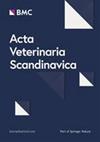加强瑞典养猪场的感染控制实践和生物安全计划:见解、挑战和战略
IF 1.7
2区 农林科学
Q2 VETERINARY SCIENCES
引用次数: 0
摘要
非洲猪瘟(ASF)对全球养猪业构成威胁,给养猪业及相关行业造成重大经济损失和广泛破坏。2023 年 9 月,瑞典野猪首次感染非洲猪瘟,当局立即采取应对措施,包括设立禁区和扑杀措施。瑞典启动了一项新的猪群 ASF 认证计划,以改善生物安全和主动疾病管理。这项调查旨在评估疫情爆发六个月后瑞典养猪户的情绪和行动,特别是在生物安全措施方面。这些信息对于提高应对未来疾病威胁的能力非常重要。我们向瑞典养猪生产者组织的成员发放了调查问卷。共有 113 名养殖户做出了答复(答复率为 27%),其中大多数人认为 ASF 在瑞典再次出现的风险很高。将农场与 ASF 认证计划联系起来的估计成本差异很大,大多数人认为成本是一大障碍。虽然许多农场主向兽医寻求生物安全建议,但 43% 的农场主并未实施建议的措施。超过三分之一的农民没有得到适合其农场的具体措施,14%的农民根本没有从兽医那里得到任何生物安全建议。养殖户在讨论中强调了对 ASF 爆发、传播机制和监管合规性的担忧,突出了持续沟通和知识交流对有效应对 ASF 带来的挑战的重要性。此外,与会者还提到,野猪种群密集和城市食物垃圾管理的缺陷也是重要的风险因素。做出答复的农民普遍对新的 ASF 爆发表示担忧。大多数人认为成本是加入 ASF 认证计划的一大障碍。虽然许多农场主向兽医咨询生物安全方面的建议,但相当多的农场主尚未实施建议的措施,三分之一的农场主没有收到适合其农场的具体指导。利益相关者的谈话强调了对 ASF 爆发、传播和合规性的担忧。他们还讨论了密集的野猪种群和城市食物垃圾管理问题作为 ASF 重要风险因素的作用。本文章由计算机程序翻译,如有差异,请以英文原文为准。
Enhancing infection control practices and biosecurity plans on Swedish pig farms: insights, challenges, and strategies
African swine fever (ASF) poses a threat to the global pig industry, leading to significant economic losses and widespread disruptions in pig farming and associated sectors. In September 2023, the first case of ASF in Swedish wild boar triggered immediate responses from authorities, including the establishment of restricted zones and culling measures. A new ASF certification programme for pig herds was initiated to improve biosecurity and proactive disease management. This survey aimed to assess the sentiments and actions of Swedish pig farmers six months post-outbreak, particularly regarding biosecurity measures. Such information is important to improve preparedness for future disease threats. A questionnaire was distributed to members of the Swedish pig producers' organisation. A total of 113 farmers responded (response rate 27%), with the majority considering the risk of ASF reappearing in Sweden as high. The estimated cost for connecting the farms to the ASF certification programme varied greatly, with a majority identifying cost as a substantial hurdle. While many farmers sought biosecurity advice from veterinarians, 43% had not implemented suggested measures. Over one third had not received concrete measures that would fit their farms, and 14% had not received any biosecurity advice from veterinarians at all. Discussions among farmers emphasized concerns about ASF outbreaks, transmission mechanisms, and regulatory compliance, highlighting the importance of ongoing communication and knowledge exchange to address the challenges posed by ASF effectively. Additionally, participants also mentioned the role of dense wild boar populations and shortcomings in municipal food waste management as important risk factors. The responding farmers expressed widespread concern about new ASF outbreaks. A majority identified cost as a substantial hurdle for joining the ASF certification programme. While many farmers consulted veterinarians for advice on biosecurity, a significant number had yet to implement suggested measures and one third had not received specific guidance suitable for their farms. Stakeholder conversations highlighted concerns about ASF outbreaks, transmission, and compliance. They also discussed the role of dense wild boar populations and issues with municipal food waste management as significant risk factors for ASF.
求助全文
通过发布文献求助,成功后即可免费获取论文全文。
去求助
来源期刊

Acta Veterinaria Scandinavica
农林科学-兽医学
CiteScore
3.60
自引率
0.00%
发文量
28
审稿时长
18-36 weeks
期刊介绍:
Acta Veterinaria Scandinavica is an open access journal encompassing all aspects of veterinary research and medicine of domestic and wild animals.
 求助内容:
求助内容: 应助结果提醒方式:
应助结果提醒方式:


